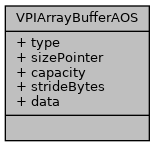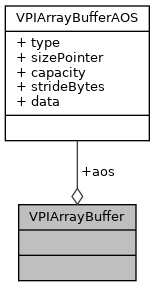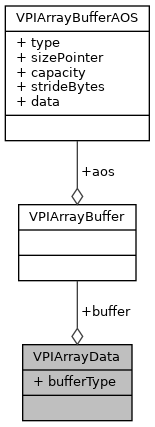An abstract representation of a generic 1D array. More...
Data Structures | |
| struct | VPIArrayBufferAOS |
| Stores information about array characteristics and content. More... | |
| struct | VPIArrayBuffer |
| Represents the availablemethods to access array contents. More... | |
| struct | VPIArrayData |
| Stores information about array characteristics and contents. More... | |
Typedefs | |
| typedef struct VPIArrayImpl * | VPIArray |
| A handle to an array. | |
Enumerations | |
| enum | VPIArrayBufferType |
| Represents how the array data is stored. More... | |
| enum | VPIArrayType |
| Array element formats. More... | |
Functions | |
| VPIStatus | vpiArrayCreate (int32_t capacity, VPIArrayType type, uint64_t flags, VPIArray *array) |
| Create an empty array instance. More... | |
| VPIStatus | vpiArrayCreateWrapper (const VPIArrayData *data, uint64_t flags, VPIArray *array) |
| Create an array object by wrapping an existing host memory block. More... | |
| VPIStatus | vpiArraySetWrapper (VPIArray array, const VPIArrayData *data) |
| Redefines the wrapped memory buffer in an existing VPIArray wrapper. More... | |
| void | vpiArrayDestroy (VPIArray array) |
| Destroy an array instance. More... | |
| VPIStatus | vpiArrayGetSize (VPIArray array, int32_t *size) |
| Returns the array size in elements. More... | |
| VPIStatus | vpiArraySetSize (VPIArray array, int32_t size) |
| Set the array size in elements. More... | |
| VPIStatus | vpiArrayGetCapacity (VPIArray array, int32_t *capacity) |
| Returns the array capacity in elements. More... | |
| VPIStatus | vpiArrayGetStrideBytes (VPIArray array, int32_t *strideBytes) |
| Returns the array stride (distance between two consecutive elements) in bytes. More... | |
| VPIStatus | vpiArrayGetFlags (VPIArray array, uint64_t *flags) |
| Returns the array flags. More... | |
| VPIStatus | vpiArrayGetType (VPIArray array, VPIArrayType *type) |
| Returns the array type. More... | |
| VPIStatus | vpiArrayLock (VPIArray array, VPILockMode mode) |
| Acquires the lock on an array object. More... | |
| VPIStatus | vpiArrayLockData (VPIArray array, VPILockMode mode, VPIArrayBufferType bufType, VPIArrayData *data) |
| Acquires the lock on an array object and returns the array contents. More... | |
| VPIStatus | vpiArrayUnlock (VPIArray array) |
| Releases the lock on array object. More... | |
Detailed Description
An abstract representation of a generic 1D array.
There are two ways of creating 1D array containers with the API. The most basic one is to use vpiArrayCreate to allocate and initialize an empty (zeroed) VPIArray object. The memory for the array data is allocated and managed by the backend implementation. Parameters such as capacity and type are immutable and specified at the construction time. The internal memory layout is also backend-specific. More importantly, efficient exchange of array data between different hardware blocks might force the implementation to allocate the memory in multiple memory pools (e.g. dGPU and system DRAM). In some scenarios (to optimize performance and memory use) it might be beneficial to constrain the internal allocation policy to support only a particular set of backends.
To enable interop with existing host- or gpu-side code, the user can also create an array object that wraps a user-allocated (and managed) array data. Similarly to vpiArrayCreate, array parameters passed to vpiArrayCreateWrapper are fixed.
The wrapped memory can be redefined by calling vpiArraySetWrapper as long as the new wrapped memory has the same buffer type, capacity, type as the one originally wrapped. It's more efficient to create the VPIArray wrapper once and reuse it later then creating and destroying it all the time.
The set of vpiArrayLockData / vpiArrayUnlock allows to read from/write to the array data from host. These functions are non-blocking and oblivious to the stream command queue so it's up to the user to make sure that all pending operations using this array as input or output are finished. Also, depending on which device the memory is allocated, lock/unlock operation might be time-consuming and, for example, involve copying data over PCIe bus for dGPUs.
Data Structure Documentation
◆ VPIArrayBufferAOS
| struct VPIArrayBufferAOS |
Stores information about array characteristics and content.
Represents array information as an array of structures (AOS).
 Collaboration diagram for VPIArrayBufferAOS:
Collaboration diagram for VPIArrayBufferAOS:| Data Fields | ||
|---|---|---|
| VPIArrayType | type | Type of each array element. |
| int32_t * | sizePointer |
Points to the number of elements in the array.
|
| int32_t | capacity |
Maximum number of elements that the array can hold.
|
| int32_t | strideBytes |
Size in bytes of each array element.
|
| void * | data | Points to the first element of the array. |
◆ VPIArrayBuffer
| struct VPIArrayBuffer |
Represents the availablemethods to access array contents.
The correct method depends on VPIArrayData::bufferType .
 Collaboration diagram for VPIArrayBuffer:
Collaboration diagram for VPIArrayBuffer:| Data Fields | ||
|---|---|---|
| VPIArrayBufferAOS | aos |
Array stored in array-of-structures layout. To be used when VPIArrayData::bufferType is: |
◆ VPIArrayData
| struct VPIArrayData |
Stores information about array characteristics and contents.
 Collaboration diagram for VPIArrayData:
Collaboration diagram for VPIArrayData:| Data Fields | ||
|---|---|---|
| VPIArrayBufferType | bufferType |
Type of array buffer. It defines which member of the VPIArrayBuffer tagged union that must be used to access the array contents. |
| VPIArrayBuffer | buffer | Stores the array contents. |
Enumeration Type Documentation
◆ VPIArrayBufferType
| enum VPIArrayBufferType |
#include <vpi/Array.h>
Represents how the array data is stored.
◆ VPIArrayType
| enum VPIArrayType |
#include <vpi/ArrayType.h>
Array element formats.
| Enumerator | |
|---|---|
| VPI_ARRAY_TYPE_INVALID | Signal type conversion errors. |
| VPI_ARRAY_TYPE_S8 | Signed 8-bit. |
| VPI_ARRAY_TYPE_U8 | Unsigned 8-bit. |
| VPI_ARRAY_TYPE_S16 | Signed 16-bit. |
| VPI_ARRAY_TYPE_U16 | Unsigned 16-bit. |
| VPI_ARRAY_TYPE_U32 | Unsigned 32-bit. |
| VPI_ARRAY_TYPE_KEYPOINT_F32 | VPIKeypointF32 element. |
| VPI_ARRAY_TYPE_HOMOGRAPHY_TRANSFORM_2D | VPIHomographyTransform2D element. |
| VPI_ARRAY_TYPE_KLT_TRACKED_BOUNDING_BOX | VPIKLTTrackedBoundingBox element. |
| VPI_ARRAY_TYPE_F32 | Floating point 32-bit. |
| VPI_ARRAY_TYPE_KEYPOINT_U32 | VPIKeypointU32 element in U32 format. |
| VPI_ARRAY_TYPE_KEYPOINT_UQ1616 | VPIKeypointU32 element in UQ1616 fixed-point format. |
| VPI_ARRAY_TYPE_STATISTICS | VPIStats element. |
| VPI_ARRAY_TYPE_BRIEF_DESCRIPTOR | VPIBriefDescriptor element. |
| VPI_ARRAY_TYPE_MATCHES | VPIMatches element. |
| VPI_ARRAY_TYPE_DCF_TRACKED_BOUNDING_BOX | VPIDCFTrackedBoundingBox element. |
| VPI_ARRAY_TYPE_PYRAMIDAL_KEYPOINT_F32 | VPIPyramidalKeypointF32 element. |
| VPI_ARRAY_TYPE_APRILTAG_DETECTION | VPIAprilTagDetection element. |
| VPI_ARRAY_TYPE_POSE | VPIPose element. |
Definition at line 69 of file ArrayType.h.
Function Documentation
◆ vpiArrayCreate()
| VPIStatus vpiArrayCreate | ( | int32_t | capacity, |
| VPIArrayType | type, | ||
| uint64_t | flags, | ||
| VPIArray * | array | ||
| ) |
#include <vpi/Array.h>
Create an empty array instance.
Array data is zeroed. Maximum capacity of the array is fixed and defined at the construction-time. Array size is set to zero. The VPIArray object owns the allocated memory.
- Parameters
-
[in] capacity Array capacity in elements. - Must be >= 0.
[in] type Type of each array element. - Can't be VPI_ARRAY_TYPE_INVALID.
[in] flags Bit field specifying the desired characteristics of the array. - The field must be a combination of zero or more of the following flags:
- VPIBackend flags. This array can be used in algorithms running in these backends. If no backend flags are passed and VPI_REQUIRE_BACKENDS flag isn't present, it'll consider all backends supported by the active context.
- Common object flags.
- If flag VPI_REQUIRE_BACKENDS is given, user must pass at least one valid backend, and they all must be enabled in current context.
[out] array Pointer to memory that will receive the created array handle.
- Return values
-
VPI_ERROR_INVALID_ARRAY_TYPE Invalid type.VPI_ERROR_INVALID_ARGUMENT Invalid flags.VPI_ERROR_INVALID_ARGUMENT capacityoutside valid range.VPI_ERROR_INVALID_ARGUMENT arrayis NULL or doesn't represent a VPIArray instance.VPI_ERROR_INVALID_ARGUMENT No backend were given and VPI_REQUIRE_BACKENDS is set. VPI_ERROR_OUT_OF_MEMORY Not enough resources to allocate array. VPI_ERROR_INVALID_CONTEXT Current context is destroyed. VPI_ERROR_INVALID_OPERATION Requested backend isn't enabled in current context. VPI_SUCCESS Operation executed successfully.
◆ vpiArrayCreateWrapper()
| VPIStatus vpiArrayCreateWrapper | ( | const VPIArrayData * | data, |
| uint64_t | flags, | ||
| VPIArray * | array | ||
| ) |
#include <vpi/Array.h>
Create an array object by wrapping an existing host memory block.
The returned handle must be destroyed when not being used anymore by calling vpiArrayDestroy.
The object doesn't own the wrapped memory. The user is still responsible for wrapped memory lifetime, which must be valid until the array object is destroyed.
- Parameters
-
[in] data Pointer to structure with memory buffer to be wrapped. - Mandatory, it can't be NULL.
[in] flags Bit field specifying the desired characteristics of the array. Depending on some buffer types, the following flags will be added automatically: Buffer type Added flag VPI_ARRAY_BUFFER_HOST_AOS VPI_BACKEND_CPU VPI_ARRAY_BUFFER_CUDA_AOS VPI_BACKEND_CUDA
- The field must be a combination of zero or more of the following flags:
- VPIBackend flags. This array can be used in algorithms running in these backends. If no backend flags are passed and VPI_REQUIRE_BACKENDS flag isn't present, it'll consider all backends supported by the active context.
- Common object flags.
- If backends are given and VPI_REQUIRE_BACKENDS is set, they all must enabled in current context.
- If backends are automatically added, they must be enabled in current context.
- Parameters
-
[out] array Pointer to memory that will receive the created array handle.
- Return values
-
VPI_ERROR_INVALID_ARGUMENT arrayis NULL.VPI_ERROR_INVALID_ARGUMENT datais NULL or contains invalid/unsupported values.VPI_ERROR_INVALID_ARGUMENT Buffer type in dataisn't supported.VPI_ERROR_INVALID_ARGUMENT No backend were given and VPI_REQUIRE_BACKENDS is set. VPI_ERROR_OUT_OF_MEMORY Not enough resources to create array. VPI_ERROR_INVALID_CONTEXT Current context is destroyed. VPI_ERROR_INVALID_OPERATION Requested backend isn't enabled in current context. VPI_ERROR_INVALID_OPERATION Automatically added backend flags aren't enabled in current context. VPI_SUCCESS Operation executed successfully.
◆ vpiArraySetWrapper()
| VPIStatus vpiArraySetWrapper | ( | VPIArray | array, |
| const VPIArrayData * | data | ||
| ) |
#include <vpi/Array.h>
Redefines the wrapped memory buffer in an existing VPIArray wrapper.
This operation is efficient and does not allocate memory. The wrapped memory will be accessible to the same backends specified during wrapper creation.
The wrapped memory must not be deallocated while it's still being wrapped.
- Parameters
-
[in] array Handle to array. - It must have been created by vpiArrayCreateWrapper.
- Array must not be locked.
[in] data Pointer to structure with host memory to be wrapped. - Mandatory, it can't be NULL.
- The existing wrapped array and the new one must have same capacity and element type.
- The old and new buffer types must match.
- The wrapped memory must point to a buffer that corresponds to the given buffer type.
- Return values
-
VPI_ERROR_INVALID_ARGUMENT datais NULL.VPI_ERROR_INVALID_ARGUMENT datahas an unsupported buffer type.VPI_ERROR_INVALID_ARGUMENT New and old buffer types don't match. VPI_ERROR_INVALID_OPERATION arrayis not created suing vpiArrayCreateWrapper.VPI_ERROR_INVALID_OPERATION datacapacity and/or format don't matcharray.VPI_ERROR_INVALID_OPERATION arrayis locked.VPI_SUCCESS Operation executed successfully.
◆ vpiArrayDestroy()
| void vpiArrayDestroy | ( | VPIArray | array | ) |
#include <vpi/Array.h>
Destroy an array instance.
This function deallocates all resources allocated by the array creation function. When destroying an VPIArray wrapper, the wrapped memory itself isn't deallocated.
- Parameters
-
[in] array Array handle to be destroyed. Passing NULL is allowed, to which the function simply does nothing. - Array must not be in use by any stream, or else undefined behavior will ensue.
◆ vpiArrayGetSize()
#include <vpi/Array.h>
Returns the array size in elements.
- Parameters
-
[in] array A valid array handle. - Mandatory, it can't be NULL.
[out] size A pointer to a variable which will be set to the size of the array. - Mandatory, it can't be NULL.
- Return values
-
VPI_ERROR_INVALID_ARGUMENT arrayis NULL or doesn't represent a VPIArray instance.VPI_ERROR_INVALID_ARGUMENT Output sizepointer is NULL.VPI_SUCCESS Operation executed successfully.
◆ vpiArraySetSize()
#include <vpi/Array.h>
Set the array size in elements.
- Parameters
-
[in] array A valid array handle. - Mandatory, it can't be NULL.
[in] size The new size of the array. - Must be less than or equal to array's capacity.
- Must be >= 0.
- Return values
-
VPI_ERROR_INVALID_ARGUMENT arrayis NULL or doesn't represent a VPIArray instance.VPI_ERROR_INVALID_ARGUMENT Input sizeoutside valid range.VPI_SUCCESS Operation executed successfully.
◆ vpiArrayGetCapacity()
#include <vpi/Array.h>
Returns the array capacity in elements.
- Parameters
-
[in] array A valid array handle. - Mandatory, it can't be NULL.
[out] capacity A pointer to a variable which will be set to the capacity of the array. - Mandatory, it can't be NULL.
- Return values
-
VPI_ERROR_INVALID_ARGUMENT arrayis NULL or doesn't represent a VPIArray instance.VPI_ERROR_INVALID_ARGUMENT Output capacitypointer is NULL.VPI_SUCCESS Operation executed successfully
◆ vpiArrayGetStrideBytes()
#include <vpi/Array.h>
Returns the array stride (distance between two consecutive elements) in bytes.
- Parameters
-
[in] array A valid array handle. - Mandatory, it can't be NULL.
[out] strideBytes A pointer to a variable which will be set to the stride of the array element, in bytes. - Mandatory, it can't be NULL.
- Return values
-
VPI_ERROR_INVALID_ARGUMENT arrayis NULL or doesn't represent a VPIArray instance.VPI_ERROR_INVALID_ARGUMENT Output strideBytespointer is NULL.VPI_SUCCESS Operation executed successfully.
◆ vpiArrayGetFlags()
#include <vpi/Array.h>
Returns the array flags.
- Parameters
-
[in] array A valid array handle. - Mandatory, it can't be NULL.
[out] flags A pointer where the flags will be written to. - Mandatory, it can't be NULL.
- Return values
-
VPI_ERROR_INVALID_ARGUMENT arrayis NULL or doesn't represent a VPIArray instance.VPI_ERROR_INVALID_ARGUMENT Output flagspointer is NULL.VPI_SUCCESS Operation executed successfully.
◆ vpiArrayGetType()
| VPIStatus vpiArrayGetType | ( | VPIArray | array, |
| VPIArrayType * | type | ||
| ) |
#include <vpi/Array.h>
Returns the array type.
- Parameters
-
[in] array A valid array handle. - Mandatory, it can't be NULL.
[out] type A pointer where the array type will be written to. - Mandatory, it can't be NULL.
- Return values
-
VPI_ERROR_INVALID_ARGUMENT arrayis NULL or doesn't represent a VPIArray instance.VPI_ERROR_INVALID_ARGUMENT Output typepointer is NULL.VPI_SUCCESS Operation executed successfully.
◆ vpiArrayLock()
| VPIStatus vpiArrayLock | ( | VPIArray | array, |
| VPILockMode | mode | ||
| ) |
#include <vpi/Array.h>
Acquires the lock on an array object.
Array locking is required when the array object wraps externally-accessible buffers, and these buffers will be accessed outside VPI. As long as the lock is held, any attempt of VPI to access the array in a mode not compatible with the lock mode will result in asynchronous stream errors, VPI_ERROR_BUFFER_LOCKED.
The array can be locked multiple times. Each lock operation increments a counter and must be matched by a corresponding vpiArrayUnlock call. Lock will fail if the array is being used by a stream.
- Parameters
-
[in] array Array to be locked. - Mandatory, it can't be NULL.
- Array must not be locked in a mode that is incompatible with given
mode.
[in] mode Lock mode, depending on whether the memory will be written to and/or read from. - Valid values are:
- Return values
-
VPI_ERROR_INVALID_ARGUMENT arrayis NULL or doesn't represent a VPIArray instance.VPI_ERROR_BUFFER_LOCKED Array is already locked by either a stream or the user. VPI_SUCCESS Operation executed successfully
◆ vpiArrayLockData()
| VPIStatus vpiArrayLockData | ( | VPIArray | array, |
| VPILockMode | mode, | ||
| VPIArrayBufferType | bufType, | ||
| VPIArrayData * | data | ||
| ) |
#include <vpi/Array.h>
Acquires the lock on an array object and returns the array contents.
Depending on the internal array representation, as well as the actual location in memory, this function might have a significant performance overhead due to type conversion, memory copies, etc.
The array can be locked multiple times. Each lock operation increments a counter and must be matched by a corresponding vpiArrayUnlock call. Lock will fail if the array is being used by a stream.
- Parameters
-
[in] array Array to be locked. - Mandatory, it can't be NULL.
- Array must not be locked in a mode that is incompatible with given
mode. - For some buffer types, the image must have the following backend enabled:
Buffer type Required backend flags VPI_ARRAY_BUFFER_HOST_AOS VPI_BACKEND_CPU VPI_ARRAY_BUFFER_CUDA_AOS VPI_BACKEND_CUDA
[in] bufType The type of buffer returned in data. It defines how the array contents can be accessed by the caller. Valid types are:[in] mode Lock mode, depending on whether the memory will be written to and/or read from. - Valid values are:
[out] data A pointer to a structure that will be filled with array memory information.. - The buffer it points to are valid until the array is unlocked.
- Return values
-
VPI_ERROR_INVALID_ARGUMENT arrayis NULL or doesn't represent a VPIArray instance.VPI_ERROR_INVALID_ARGUMENT datais NULL.VPI_ERROR_INVALID_ARGUMENT bufTypeisn't supported.VPI_ERROR_INVALID_OPERATION arraydoesn't have required backends enabled.VPI_ERROR_BUFFER_LOCKED Array is already locked by either a stream or the user. VPI_SUCCESS Operation executed successfully
◆ vpiArrayUnlock()
#include <vpi/Array.h>
Releases the lock on array object.
This function might have a significant performance overhead (type conversion, layout conversion, host-to-device memory copy).
The array is effectively unlocked when the internal lock counter reaches 0.
- Parameters
-
[in] array A valid array handle. - Mandatory, it can't be NULL.
- Return values
-
VPI_ERROR_INVALID_ARGUMENT arrayis NULL or doesn't represent a VPIArray instance.VPI_ERROR_INVALID_OPERATION arrayisn't locked.VPI_SUCCESS Operation executed successfully


